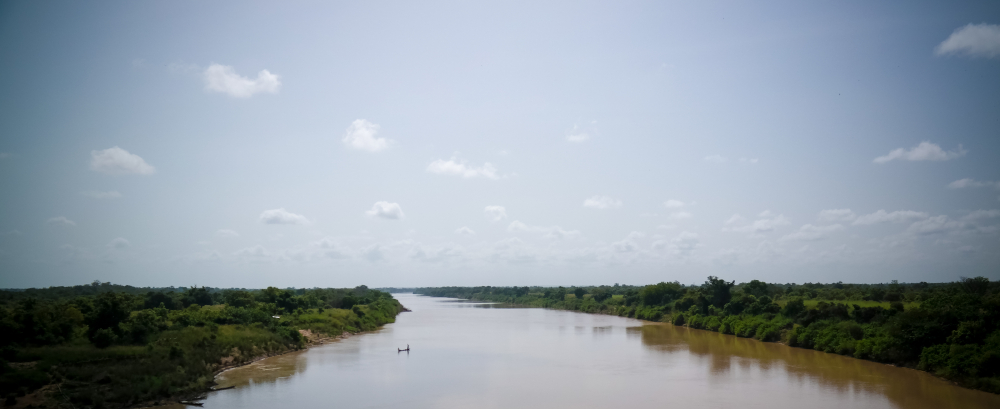In West Africa’s Volta Basin, a rapidly growing population is adding to pressure on land and water resources. One of the largest river systems in Africa, the basin spans the six West African countries of Benin, Burkina Faso, Côte d’Ivoire, Ghana, Mali, and Togo, and is home to an estimated 14 million people. All climate predictions in the basin point to reduction in water availability and higher temperatures with increased evapotranspiration. These factors alone have the potential to negatively affect water availability for energy production and agriculture now and the foreseeable future. High variability of rainfall patterns and distribution is the main factor causing fluctuations in food production in the Volta Basin, especially in the northern parts.
However, climate change makes rainfed agriculture increasingly unreliable, and the use of groundwater for irrigation is increasing. Even though most of these challenges call for basin-wide responses, until recently, the Volta River remained one of the few transboundary watercourses in Africa without an international treaty and without a basin wide coordination mechanism. Selected as one of the original WACDEP priority regions, the Volta Basin is an example of how the programme’s work packages complemented one another to build water security and climate resilience, and of how working together has enabled affected countries to direct the evolution of interventions. Regional and transboundary cooperation, national development planning, investment planning, and project preparation and financing were brought together through partnerships, capacity building, and knowledge development to create new options for the region and its people.
Effective partnerships
WACDEP worked in partnership with the Economic Community of West African States, the Volta Basin Authority, and the Regional Technical Advisory Committee of the African Ministers Council on Water (AMCOW) for West Africa. As part of GWP’s work on water and climate resilience in partnership with WMO on the Associated Programme on Flood Management (APFM) and IDMP, a €6.7 million project was prepared and approved by the Adaptation Fund in 2018 to strengthen flood and drought management in the Volta Basin.
Regional and transboundary investment planning
In 2014, WACDEP supported the Volta Basin Authority in production of an assessment of the current state of water management and climate change in the Volta Basin as part of planning for an Observatory for Water Resources and Associated Ecosystems. This compilation of existing, but previously scattered, knowledge about conditions in the basin and the capacity of the VBA led to WACDEP’s support for the development of the Volta Basin Master Plan for Development and Sustainable Management of Water Resources and Strategic Action Plan in 2015. In addition, support was provided for the development of a project concept note to set up an early warning system for droughts, floods, and pollution in the Volta Basin.
National development
In parallel, WACDEP’s support to the governments of Burkina Faso and the Niger in developing their National Adaptation Plans increased the basin member states’ sensitivity to the need for climate-resilient approaches. In 2016, GWP and WMO, through the APFM, carried out flood management needs assessments at the national level in Benin, Burkina Faso, Ghana, and Togo.
Demonstrating drought resilience
Field demonstration projects in Burkina Faso and Ghana showed how drip irrigation and solar energy systems could help farmers produce better crops with less waste, and how reforestation could work against drought and desertification.
Capacity building and knowledge
To both build capacity and increase knowledge flows, in 2018 media practitioners from Benin, Burkina Faso, Côte d’Ivoire, Ghana, Mali, the Niger, and Togo increased their potential in a regional workshop, Integrated Drought and Flood Management: Contribution of Media Men/Women in Advocacy and Awareness-raising in West Africa.
Project preparation and financing
Building on previous work accomplished by IDMP and APFM, in 2018 WACDEP and the WMO secured access to €6.7 million from the Adaptation Fund to support a flood and drought programme. The programme would assist the basin’s riparian countries in the first large-scale and transboundary implementation of integrated flood and drought management by building the capacity of national meteorological and hydrological services and other authorities of the six riparian countries. The funds are being used to develop and adopt coordinated measures to improve existing management plans to build better early warning systems for flood and drought at the regional, national, and local levels.
Photo: Volta River, Ghana, by Mostphotos.com/Sergey Mayorov

